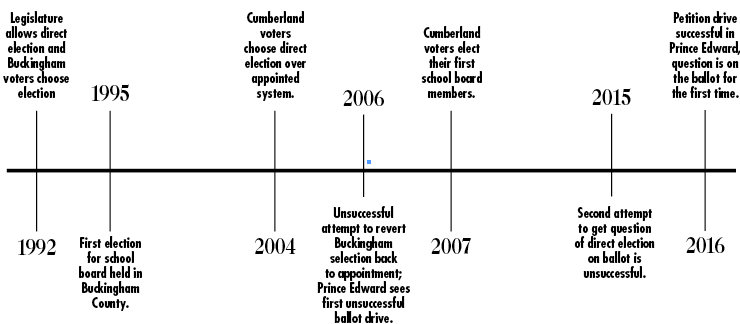Appointed versus elected
Published 12:45 pm Thursday, October 27, 2016
Editor’s note: As Prince Edward County voters head to the polls Nov. 8 to decide whether or not to elect their school board members, we dive into the topic, talking to objective experts and what experience other counties have had with the issue.
By Jordan Miles
The Farmville Herald
Standing alone as the only locality in the Heart of Virginia that still appoints its school board members, Prince Edward County voters will have the opportunity Nov. 8 to do more than just help choose the next president of the United States.
For the first time in the county’s history, voters will decide whether to directly elect its school board members or keep the remaining system of having county supervisors appoint the school leaders.
A referendum on the matter will appear before voters following two previous unsuccessful attempts to get it on the ballot in 2006 and 2015. The state legislature agreed to allow counties and cities to directly elect members of its school boards 24 years ago.
While neighboring Buckingham County was among the first to jump on the bandwagon in 1992 to make the change, it hasn’t always been smooth sailing. In 2006, amid a fierce struggle between the school board and board of supervisors over school construction and renovation plans, a petition circulated in the county, attempting to reverse the choice.
Cumberland County voters started electing its school board members less than 10 years ago. Though voters approved the ballot measure in 2004, the first elected board was seated in January 2008.
Objective experts’ views
“Both systems involve politics,” said Dr. Charol Shakeshaft, an educational leadership professor at Virginia Commonwealth University, who’s taught for nearly 40 years. “Elected boards are more transparent about the politics.”
Shakeshaft said elected school boards are more likely to spend more time during the week on board work, be involved in the community, be more committed to open meetings, include members older in age and in years having lived in the community, include minorities, have children more likely to attend private schools and be more likely to reduce school spending. She said appointed board members are more likely to devote more time overall to the board, have higher incomes, be more experienced, be less likely to micromanage, be better educated, be more motivated to serve the whole community and “consider their work service rather than political responsibility.”
“There are appointed boards that I have experienced that have been excellent and there are elected boards that I have worked/lived with that are excellent,” she said, depending on who was elected or appointed, and who did the appointing.
Shakeshaft said, depending on how politicized a county is, board members may feel or be expected to be loyal to those who appoint them.
She also said that during budgetary times, boards of supervisors and school boards must work together.
“There are always questions or concerns that someone ‘appointed’ to a position will be beholden to the group that appointed them. Though I have never seen this,” she said, “some may question if it does impact the decision-making process of board of education members.”
Dr. Gerry Sokol, a professor and coordinator of educational leadership in Longwood University’s College of Education and Human Services, said he believes efficiency and administrative differences are small between appointed and elected school boards.
“However, the constituents of an elected board member may feel they have a greater voice or at least a link to school board policy decisions,” Sokol said. “Occasionally, parents will feel more comfortable raising classroom or school concerns directly to the elected board member instead of working through the chain of command at the school level.”

A storied regional history
A petition drive spearheaded in the summer of 1992 by members of Buckingham’s Republican Committee led to the referendum there being approved by voters, leading to the first school board election in 1995. The final tally was 3,630 for and only 800 against.
Marie Hill, one of the petition organizers in 1992, said at the time it was an opportunity for voters “to take part in selecting who their representatives are rather than being told who will represent them.”
Hill served on the board of supervisors at the time. She launched her petition after her unsuccessful attempt to appoint Dee Anderson to the school board. The board of supervisors chose instead to reappoint incumbent James Shumaker.
A fellow supervisor, the late Robert Samuels, opposed the measure. Also quoted in 1992, he said, “The education of our children should be as far removed from politics as possible.”
Buckingham County used a school board commission to appoint school board members until 1989, when a referendum allowed the board of supervisors to make appointments. A circuit court judge appointed the commission of three who then selected school board members for each magisterial district.
There were few candidates in Buckingham for the first school board election. Only District One saw ballot competition while the District Four candidate withdrew, creating a last-minute campaign between two write-in candidates. The other districts had only one person each seek election.

Cumberland County didn’t make the switch from appointed to elected school boards until 2004.
That November, 2,835 voters favored an elected school board; 1,147 favored the existing commission-appointed system.
Dr. Judy Duncan, who chaired the court-appointed Cumberland County selection commission, was quoted in 2004 as saying with voters electing board members, the “brightest and best” candidates should be encouraged to run. However, Duncan also expressed personal reservations about an elected school board, including the potential of members to be self-serving, opting for re-election in spite of the best interests of the schools.
In 2007, when the first election was held for the Cumberland school board, all but one of the five seats saw competing candidates.
The competition for school board seats in Buckingham and Cumberland has since decreased.
Last November, only one seat in Buckingham saw opposing candidates; all others ran unopposed. Cumberland’s school board races saw no competition last year, and one seat didn’t have anyone on the ballot, resulting in a write-in candidate winning.
An attempt
for reversion
in Buckingham
Just 12 months before Cumberland County voters headed to the polls for the first opportunity to choose their school board members, Dr. Brian Bates — vice chairman of the Buckingham County Board of Supervisors — circulated petitions seeking to reverse Buckingham’s 1992 decision.
The drive to revert back to an appointed board came amid an intense struggle between the elected board and the board of supervisors over improving school facilities. Despite his position as a supervisor, Bates indicated he was acting as a private citizen in circulating the petitions. In 2006, he told The Herald that while he had originally voted for having an elected school board, the move had been “an unmitigated disaster.”
The petition effort fell short, only gathering 512 of the needed 865 signatures.
Shelton Foster, who served on the Buckingham County School Board for more than 38 years under all three styles of selection, said in 1996, “being elected by the people that you represent is probably the best way to go, I would think.”
Bates’ attempt at reverting Buckingham’s elected school board back to appointed led to the first shot at Prince Edward electing its school board.
In Aug. 2006, Brian Lee, a social studies teacher at Prince Edward County High School, said he was inspired by Bates’ actions to unsuccessfully seek a ballot measure to switch to an elected school board. Lee claimed there were things happening in the schools the board was not addressing.
At the time, he said an elected school board in Prince Edward would be “accountable to the people,” not to the board of supervisors.
Ten years after the unsuccessful ballot attempt, voters in Prince Edward will make the choice themselves.
Discerning
the transition
During the struggle between Buckingham’s school board and board of supervisors in 2006 and Bates’ unsuccessful attempt to appoint school board members, Larry A. Massie, Buckingham’s division superintendent, sought his doctoral degree from Virginia Tech.
His studied the perceptions of superintendents and school board members who experienced the transition from appointed to elected school boards.
For his dissertation, Massie spoke to 15 superintendents and 15 school board members who experienced the transition from appointed to elected school boards in Virginia between 1994-2006.
“Superintendents indicated the transition from appointed to elected school boards had a significant effect on school division overall operation and budgeting,” Massie wrote in his dissertation. “The superintendents also said there was a somewhat to significant effect on their level of stress brought about by the transition. School board members answered every one of the original 12 questions with responses of no effect or very little effect. Superintendents indicated the transition from appointed to elected school boards had a somewhat negative effect, while school board members said there was no effect.”
Massie said the issue of micromanagement by school board members was mentioned as a problem several times by both superintendents and school board members.
According to Massie, the superintendents who reported significant effects on the administration of the schools with their board members as a result of the transition identified several reasons: “the board refused to change meeting times and dates and ‘second guessed’ the superintendents’ decisions, and more time had to be spent with each member with elected boards, rather than just with the chairman of an appointed board.”
Massie’s research found no superintendent in the study reported an extreme effect on the administration of the schools as a result of the transition.






